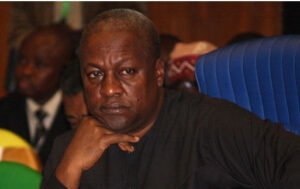
The writer

Climate change simply refers to a marked change in the world’s hitherto known or structured climate pattern, brought about by the activities of man, including the excessive release of greenhouse gases (GHG) into the atmosphere or the burning of fossil fuels.
Climate change has always existed over the course of our planet’s history. But the global warming that we have been seeing for around the last 150 years is anomalous because it is the result of human activity.
Although still shrouded in some mystery, the visible signs of climate change are all around us every day. This is shown by the unbearable scorching sun, the torrential rains, the uncertain rainfall pattern, severe and prolonged harmattan and rising sea levels as a result of melting ice from the Antarctic that continues to submerge communities along the coast, among other factors
This should continually serve as a reminder to world leaders and indeed everyone that unless a concerted, systematic, global action is adopted to stop negative human activities that destroy our planet, human survival could be at risk.
Rising desert conditions and extreme heat waves, greenhouse emissions, dying water bodies, landslides and recurrent flooding that is pummeling various parts of the world at such a ferocious rate is a timely signal to humanity to refurbish the planet today, not tomorrow, or face extinction.
Climate crisis
For instance, UNICEF’s Children’s Climate Risk Index (2021) found that children and the youth in Ghana, West and Central Africa are disproportionately at risk from climate change and environmental factors. The unfolding climate crisis affects every facet of our life, intensifying unemployment, inequality and food insecurity, and threatening the resilience of our society.
With over 70 per cent of Ghanaians under the age of 35, this is a real emergency and we need to mobilise youth voices on climate change.
Again, climate change is going to increase the gap between the rich and the poor and the quality of their lives and that is not fair. That is not equitable A situation that can make most people unhappy, as it has in other parts of the world.
So we should not see climate change just as an environmental issue but also a social issue which can drive nations to a point where the people are so unhappy about the current situation as has happened in several other countries in the world.
Even though African countries’ contribution to climate change has not been vast, the continent, particularly Ghana, is bearing the brunt of the effects. We are at the receiving end of this global action. Africa’s contribution to global warming is very minuscule. But unfortunately, we are paying the price for this global action.
For example, cocoa production, one of the major sources of revenue for the country, has been negatively affected.
People may think this is an academic exercise but where I come from, I live through this climate change. A lot of you know that in Western North, Bia East and West are epicenter of cocoa production. Not anymore. The cocoa belt is moving southwards as a result of climate change and now the epicenter in the areas of Bogoso and Prestea which used to be too wet for cocoa production, these northern portions are now suitable for cashew and other resistant trees.
Undoubtedly, the climate crisis is reaching a tipping point, and the science, data, and events, both at national and global levels are clearly pointing to the devastating nature of the crisis.
Without tackling climate change, we cannot eradicate poverty, we cannot eliminate hunger, we cannot generate good health and well-being, we cannot build sustainable cities and communities, we cannot protect life below water, we, certainly cannot protect life on land.
Concerted efforts
It will therefore not be out of place to emphasise how important it is for all of us to commit to immediate climate actions. Today, the problem has been well articulated.
It is not that too little sun warmth is reaching the earth, but that too much is being trapped in our atmosphere. So much heat is being kept inside greenhouse earth that the temperature of the earth is going up faster than at any previous time in history.
This is why scientists across the globe have stopped focusing just on global warming and are now focusing on the larger topic of climate change.
Obviously, the impact of climate change is affecting all countries, particularly the developing ones, largely considered most vulnerable. In Ghana, conscious efforts are being made to reduce its negative impact which poses critical challenges to development.
That notwithstanding, there is the need for a concerted global action to reduce climate change and climate variability if we are to sustain global development efforts. There are schools of thought which argue that many of the measures put in place to reduce the effects of climate change are not actually targeted at increasing resilience of affected people to climate change.
The measures are rather reactionary and turn out to be ultimately more costly and could, therefore, hardly address effectively impacts that are anticipated in the long term.
I believe that adopting a proactive and targeted approach is obviously more effective and less costly than responding reactively to climate change impacts as they happen.
Three years ago, interestingly, in a speech read for the UN Secretary General Antonio Guterres by the Under-Secretary-General for Economic and Social Affairs, Mr Liu Zhenminto, to mark the UN day at a Sustainable Development Forum, the Secretary General noted that they were off track and referred to climate crisis, deadly conflicts, gender-based violence and the rising hunger and persistent inequalities which were undermining efforts to achieve the Sustainable Development Goals by 2030.
Truth is, we should also appreciate the fact that the Secretary General had stressed the need to act quickly and in a more coordinated manner. The lessons from the speech cannot be discarded if we really want to disentangle ourselves from the shackles of climate challenges.
However, I think we need effective partnerships and adequate resources to reorient our economic, financial and governance systems as stated by the Secretary General, for growth to benefit all and support a healthy environment.
More importantly, at the government, community and individual levels, everyone has a key role to play to adopt functional strategies to minimise the negative effects of climate change.
The writer is a student of the Ghana Institute of Journalism (GIJ).







